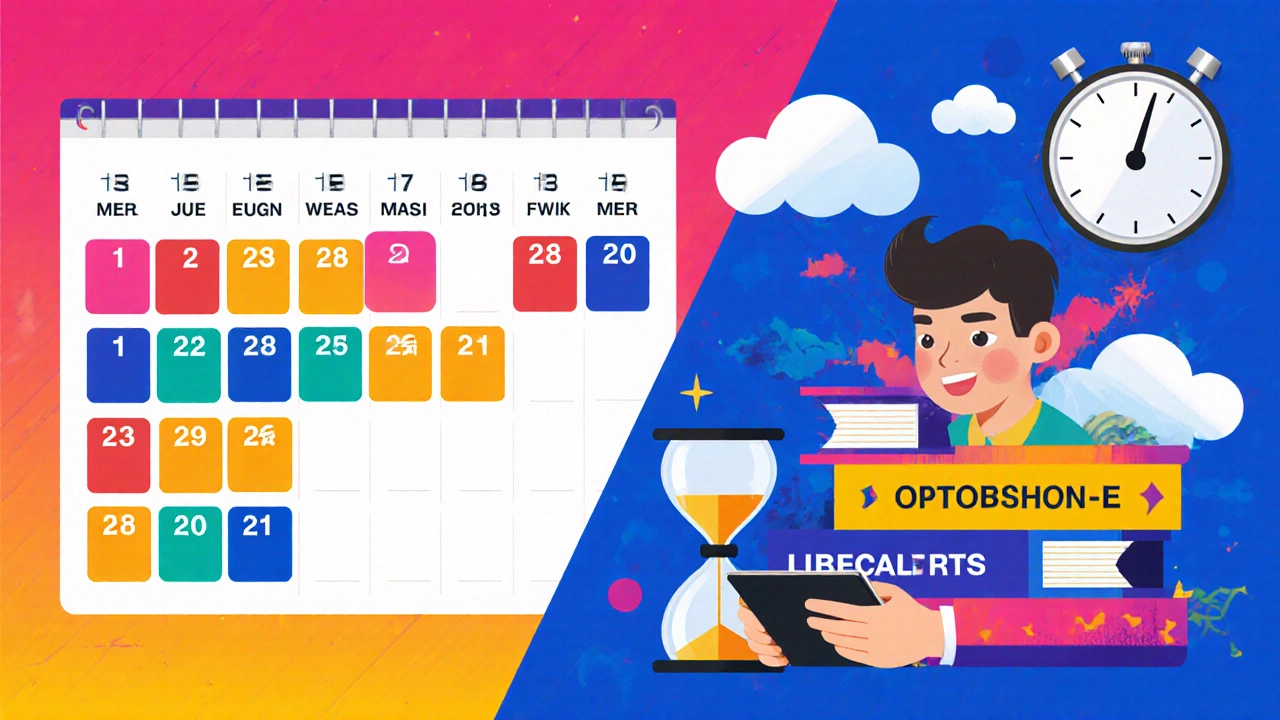Oct
16

- by Dhruv Ainsley
- 0 Comments
Looking for a credential that won’t take forever to finish? You’re not alone-many students ask, "What is the quickest degree to get online?" The good news is that a range of accredited programs let you graduate in as little as a few months to two years, depending on how much time you can invest and which type of qualification you choose.
What counts as a "quick" online degree?
First, let’s clear up the jargon. An online degree is a formal academic credential earned through courses delivered via the internet. The speed of completion varies by three main factors:
- Degree type (certificate, associate, bachelor)
- Program structure (traditional semester vs. accelerated or competency‑based)
- Credit flexibility (transfer credits, prior‑learning assessment, stackable courses)
Below is a quick snapshot of the fastest paths.
| Degree Type | Typical Duration | Credits Required | Average Cost (USD) | Sample Programs |
|---|---|---|---|---|
| Certificate | 3-6 months | 12-30 | $1,200-$4,500 | Google IT Support, Coursera Business Analytics |
| Associate's degree | 12-18 months (accelerated) | 60‑64 | $6,000-$12,000 | Western Governors University (WGU) Business, University of the People Health Science |
| Bachelor's degree | 18-24 months (competency‑based) | 120‑130 | $9,000-$18,000 | Southern New Hampshire University (SNHU) Marketing, WGU IT |
Accelerated Associate's Degrees
When you need a credential that opens doors to entry‑level jobs but still wants to finish quickly, an Associate's degree is a solid choice. Many online schools structure the curriculum into 8‑week modules, allowing you to rack up credits faster than a traditional semester.
Top programs that consistently deliver the quickest online degree experience include:
- Western Governors University - Business Administration (finished in 12‑15 months)
- University of the People - Health Science (12‑18 months, tuition‑free except for assessment fees)
- Southern New Hampshire University - Liberal Arts (14‑16 months, flexible start dates)
All three are regionally accredited, which means your credits will transfer to most four‑year institutions if you decide to continue.
Fast‑Track Bachelor's Degrees
If you need a full bachelor’s credential but want to avoid the usual 3‑4‑year timeline, look for competency‑based or credit‑stacking programs. A Bachelor's degree delivered by schools like WGU or SNHU can be completed in 18‑24 months when you already have some college credits or relevant work experience.
Key features of these programs:
- Self‑paced learning: You progress after proving mastery, not after a set semester.
- Prior Learning Assessment (PLA): Earn up to 30 credits for work, certifications, or military training.
- Flat‑rate tuition: Pay per term rather than per credit, which encourages faster completion.
Example fast‑track bachelor's tracks:
- WGU - Information Technology (often finished in 2years with PLA)
- SNHU - Marketing (18‑month intensive pathway)
- Capella University - Business (FlexPath, self‑paced)
Short‑Duration Certificate Programs
Certificates sit at the top of the speed ladder. Many can be earned in a single semester (3‑4months) and focus on highly marketable skills. Because they don’t require a full credit load, you can dive straight into coursework.
Popular fast certificates include:
- Google IT Support Professional Certificate - 6months, zero tuition, industry‑recognized.
- Coursera Project Management Specialization - 4months, $2,800 total.
- edX MicroMasters in Data Science - 5‑month intensive, $3,600.
While certificates aren’t “degrees,” they often serve as stepping stones into associate or bachelor's programs via credit articulation agreements.

How to Choose the Right Accelerated Program
Speed matters, but only if the program is reputable. Use this checklist before you enroll:
- Accreditation: Verify regional accreditation (e.g., Middle States, NWCCU) rather than just national or programmatic accreditation.
- Transfer Policy: Confirm that credits earned can move to other institutions if you plan to continue education.
- Cost Transparency: Look for flat‑rate tuition per term; avoid hidden fees for labs or technology.
- Student Support: Access to mentors, tutoring, and career services is crucial when you’re moving fast.
- Exit Options: Some schools let you finish with a certificate if you can’t complete the full degree.
Tips for Finishing Fast Without Burning Out
Speed is a marathon, not a sprint. Here are proven strategies:
- Map out a study calendar before classes start. Block consistent 2‑3hour windows each weekday.
- Leverage prior learning assessments early to shave off up to a third of the required credits.
- Stack courses that share similar textbooks or project requirements to reduce duplicate work.
- Use active recall and spaced repetition for exam prep; these methods cut study time by 30‑40%.
- Stay in touch with an academic advisor every month to catch any prerequisite gaps before they become blockers.
Common Pitfalls and How to Avoid Them
Even the most motivated learners hit snags. Knowing the traps helps you sidestep them:
- Choosing a non‑accredited school - It may look cheap, but employers and other universities won’t recognize the credential.
- Underestimating workload - Accelerated modules can demand 15‑20hours per week. Plan realistic weekly hours.
- Skipping the tech check - A reliable internet connection and a compatible device are non‑negotiable for synchronous labs.
- Ignoring financial aid deadlines - Many schools offer scholarships that apply only to certain enrollment periods.

Real‑World Example: From Zero to Associate in 13Months
Meet Maya, a 28‑year‑old marketing assistant from Melbourne. She needed a credential to qualify for a junior data analyst role. Maya enrolled in Western Governors University’s Associate of Applied Science in Business. She used the following plan:
- Completed a prior‑learning assessment for two semesters of college she took in high school (earned 30 credits).
- Allocated 20hours a week to the 8‑week modules, finishing each two weeks ahead of schedule.
- Leveraged the school’s mentorship program for quick feedback on assignments.
The result? She earned the associate degree in 13months and landed a data analyst job with a 15% salary bump.
Bottom Line: Your Fast Path Depends on Goals
If you need a quick boost for a specific skill, a certificate is the fastest route. For a broader credential that still keeps the timeline short, look at accredited accelerated associate or competency‑based bachelor’s programs. The key is to match the program’s structure with your available time, budget, and long‑term career plan.
Frequently Asked Questions
What is the shortest credential I can earn online?
A professional certificate can be completed in 3‑6months, depending on the program. Examples include Google IT Support and various Coursera specializations.
Are accelerated online degrees accredited?
Yes, reputable schools such as WGU, SNHU, and University of the People hold regional accreditation, which is recognized by employers and other universities.
Can I transfer credits from a fast online associate to a four‑year university?
Most regionally accredited associate degrees transfer seamlessly. Always check the target university’s transfer policies and speak with an advisor.
How does competency‑based education speed up a bachelor's degree?
Instead of waiting for a semester to end, you advance when you prove mastery of a topic. This lets you skip material you already know, cutting the typical 4‑year timeline to about 2years.
Is there financial aid for accelerated online programs?
Federal Pell Grants, FAFSA, and many schools’ own scholarships apply to accelerated programs, but you must meet the same eligibility criteria and deadlines as traditional students.





